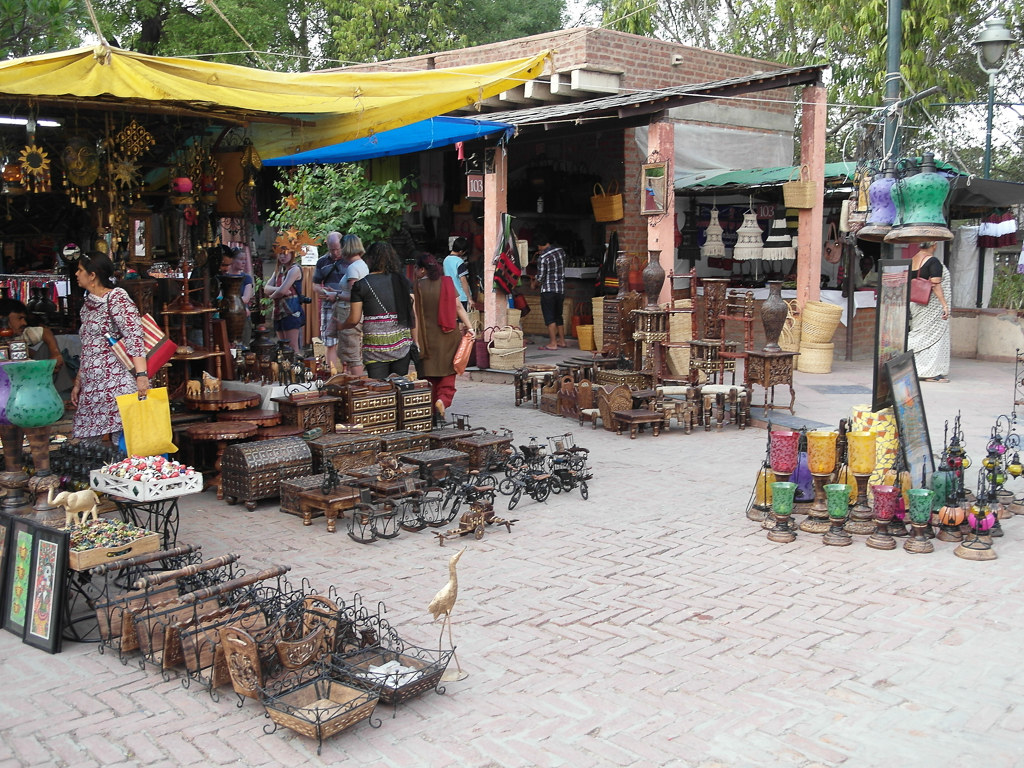Nestled in the heart of Delhi, Dilli Haat stands as a vibrant testament to India’s rich cultural heritage and artistic traditions. This open-air market is a treasure trove of handicrafts, offering visitors a unique opportunity to explore and experience the diverse artistry of the country. As you step into this bustling bazaar, you’re immediately enveloped by a kaleidoscope of colors, textures, and aromas that transport you to different corners of India.
One of the most striking features of Dilli Haat is its ever-changing landscape of handicrafts. The market operates on a rotational basis, with artisans from various states showcasing their wares for a limited time before making way for new exhibitors. This dynamic setup ensures that each visit to Dilli Haat is a fresh experience, with new crafts and artisans to discover.
As you wander through the market, you’ll encounter a dazzling array of handcrafted items. From intricately woven textiles to delicately carved wooden figurines, there’s something to catch every eye. The vibrant Madhubani paintings from Bihar, with their bold colors and intricate patterns, are particularly captivating. These traditional artworks often depict scenes from nature and mythology, offering a glimpse into the rich storytelling traditions of the region.
Moving on, you might find yourself drawn to the shimmering brocades and silk sarees from Varanasi. These luxurious textiles, woven with gold and silver threads, showcase the unparalleled skill of Indian weavers. Nearby, the earthy tones of blue pottery from Jaipur provide a striking contrast. These delicate ceramics, adorned with intricate floral and geometric patterns, are a testament to the enduring appeal of traditional craftsmanship.
As you continue your exploration, the air becomes fragrant with the scent of sandalwood and incense. This olfactory journey leads you to stalls selling aromatic oils, soaps, and other natural beauty products. Many of these items are made using age-old recipes and techniques, offering a glimpse into India’s ancient wellness traditions.
The handicrafts at Dilli Haat aren’t just beautiful to look at; they also tell stories of the communities that create them. Take, for instance, the vibrant Phulkari embroidery from Punjab. These intricate designs, traditionally created by women for their wedding trousseaus, speak volumes about the region’s cultural practices and artistic heritage. Similarly, the tribal art from states like Madhya Pradesh and Chhattisgarh offers insights into the beliefs and lifestyles of India’s indigenous communities.
One of the most rewarding aspects of exploring Dilli Haat is the opportunity to interact directly with the artisans. Many are more than happy to share the stories behind their crafts, explaining the techniques and traditions that have been passed down through generations. This personal connection adds depth to the shopping experience, allowing visitors to appreciate the human stories behind each handcrafted item.
As your journey through Dilli Haat comes to an end, you’ll likely find yourself laden with unique souvenirs and gifts. But more than just material purchases, you’ll leave with a deeper appreciation for India’s diverse artistic traditions. The market serves as a living museum of sorts, preserving and promoting crafts that might otherwise be lost in the face of mass production and changing consumer preferences.
In essence, Dilli Haat offers more than just a shopping experience; it’s a cultural immersion that allows visitors to explore the length and breadth of India through its handicrafts. Whether you’re a seasoned art enthusiast or a curious traveler, this vibrant marketplace promises a sensory feast and a chance to take home a piece of India’s rich artistic heritage.Dilli Haat stands as a vibrant cultural hub in New Delhi, showcasing India’s diverse crafts, cuisines, and traditions. This open-air marketplace successfully blends commerce with cultural preservation, offering visitors an authentic taste of regional handicrafts and foods from across the country. By providing a platform for artisans and craftspeople to directly sell their wares, Dilli Haat supports traditional livelihoods while introducing urban consumers to India’s rich cultural heritage. Its popularity among locals and tourists alike demonstrates the enduring appeal of India’s artistic traditions and the importance of spaces that celebrate and sustain cultural diversity in modern urban settings.

